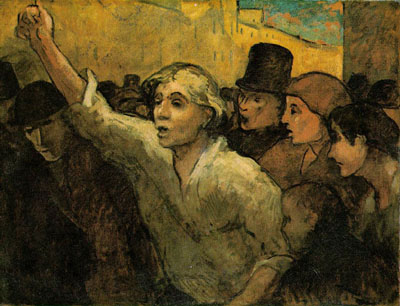Elite Attitudes Towards the "Dangerous Classes"
Edward R. Udovic, (1993)
""What About the Poor?" Nineteenth-Century Paris and the Revival of
Vincentian Charity," Vincentian
Heritage Journal: Vol. 14 : Iss. 1
, Article 5.
Available at:
https://via.library.depaul.edu/vhj/vol14/iss1/5
| In
this passage Udovic, a Catholic priest, is laying the ground
work for an article about the reaction of his church’s response
to poverty in 19th
century France. To refer to the poor, he uses the French term
Les Miserables, meaning “the miserable or wretched ones”
borrowed form the title of a novel by Victor Hugo. |
What Made the Poor so Dangerous?
There can
be little doubt that during this era, from the perspective of the ruling
classes, the working class poor of Paris were correctly identified as being the “dangerous" poor. The question however
must be asked; what was it exactly that made the Parisian poor so
dangerous? For the ruling classes the measure of their own keenly felt
sense of the
dangers posed to them and their
comfortable world by the poor, was exactly the measure of the personal
dangers that were keenly felt by the poor themselves as they lived in
the midst of their uncomfortable world, a world that was created by the
exigencies of the iron grip of the status-quo of a highly stratified
French society. It was in this widening, seemingly unbridgeable chasm
between the classes, that the class warfare which came to be one of the
characteristics of the nineteenth century was born.
correctly identified as being the “dangerous" poor. The question however
must be asked; what was it exactly that made the Parisian poor so
dangerous? For the ruling classes the measure of their own keenly felt
sense of the
dangers posed to them and their
comfortable world by the poor, was exactly the measure of the personal
dangers that were keenly felt by the poor themselves as they lived in
the midst of their uncomfortable world, a world that was created by the
exigencies of the iron grip of the status-quo of a highly stratified
French society. It was in this widening, seemingly unbridgeable chasm
between the classes, that the class warfare which came to be one of the
characteristics of the nineteenth century was born.
The Attitude of the French
Government.
Throughout this
era successive French governments denied any necessity for increasing
public spending on behalf of the relief of the poor, whose very numbers
and existence they consistently underestimated, discounted, or denied.
As far as the government was concerned, true, unblameworthy poverty
affected only a relatively small number of what were, in fact, an
increasingly mythical class of those who had been described
traditionally as being "a comfortable clientele of honest artisans, old
folk, widows, and nursing babes." These groups alone were considered to
be the "industrious and deserving poor" who represented a population
which it was assumed could be supported, easily and minimally, without
any further bothersome increases in government expenditures or
attention. For the government and its ruling classes, "the problem of
poverty came to be related only to an infinitesimal number of persons
and was thus stripped of all its gravity and horror."
As far as the
French government and ruling classes were concerned, then, what was
considered to be the
problem? This key question can be answered by
paraphrasing the above quotation in the following way: "the problem of
crime came to be related to an almost infinite number of persons and was
thus invested with a tremendous sense of gravity and horror." The
ever-increasing crime, violence, social problems, civil unrest, and
strident socialist rhetoric which naturally accompanied
la misere
were not connected in the mind of the
government or the ruling classes to any of the direct consequences of
capitalism and the Industrial Revolution but rather with what they saw
as the moral and criminal failings of the poor themselves whom they
largely judged to be the "agents of their own misfortunes."
(Paul Christophe,
Les pauvres et la pauvrete du XVI siecle ii
nos jours: Ileme partie, (Paris: 1987),
113.
As
the contemporary social analyst Eugene Buret commented:
|
If you make
your way into the old districts ... into the crowded streets of
the VIIIth, IXth, and XIIth arrondissements ... into these
accursed districts ... wherever you go you will see men and
women branded with the marks of vice and destitution, half-naked
children rotting in filth and stifling in airless, lightless
dens. Here in the very home of civilization, you will encounter
thousands ... reduced by sheer besottedness to a life of
savagery; here you will perceive destitution in a guise so
horrible ... that it inspires disgust and horror, for it assails
all the senses at once....It will fill you with disgust rather
than pity and you will be tempted to regard it as the fitting
punishment for a crime." (Eugene Buret,
La misere des classes laborieuses en
France et en Angleterre, cited
in Chevalier,Dangerous
Classes, 359-60.) |
The almost sole focus of governmental activities in this era, with respect to the poor, was therefore not to control or regulate industry, or physically to improve the living conditions in the working class sections of Paris, or even to minimize the wide ranging negative social effects of the Industrial Revolution on the working classes; rather it was to control, morally correct, and if necessary punish what were seen as the criminal, asocial, irreligious, and immoral lives of les classes dangereuses.